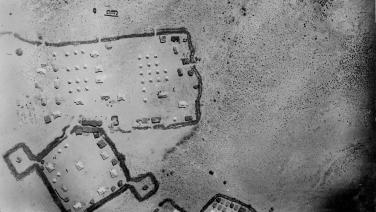
16:00, Presentation. Ana Teixeira Pinto, Oier Etxeberria, and German Labrador.
During this presentation, those responsible for the Evil Eye project will talk about the origins of the underlying research behind the exhibition offering, and the ways that it will expand along the way through Tabakalera (Donostia-San Sebastian), the Reina Sofía National Art Museum (Madrid), and the Akademie der Künste der Welt ADKDW (Cologne). The speakers will take the opportunity to expand upon the notions that run through current research in progress, presenting specific case studies and eliciting public discussion.
17:00, Conference. Azucena Vieites
Hey Baby! Low-fi artistic practices and contemporary visual culture
Azucena Vieites
This involves reflecting on the factors that intervene in image perception and production processes through a remake of the artist’s work within the framework of the Evil Eye offering. Redefinition work that began in the 1990s based on references and materials from the contemporary visual landscape, between DIY ways of working -connected to a low-fi aesthetic- and feminist thought. Forms of expression used by heterogeneous social groups that do not feel represented by an official majority culture that determines what is visible and what must be made invisible.
Conferencia Diaz Cuyas:
Areal images, gasified bodies
Modernity tends to blur bodies and places that expose themselves in the process of image disembodiment and gasification. Around 1800, two powerful visual devices arrived: hot air balloons and phantasmagoria. Both find their origins in the clouds and areal domination. While the Montgolfier brothers were in pursuit of an artificial cloud when building their pompe à feu, phantasmagoria sessions were born as figures projected onto smoke. They were not simply optical machines, they were also vapour. These images, liberated by areal movements, were a parody of free circulation on the market. Before being built as a grand spectacle, balloons were used for military purposes. The celebrated phantasmagoria developer Robertson also applied his optical knowledge to entertainment after an unsuccessful attempt to offer a ‘death ray’ to the French military.
This gasification process began to be used in the First World War, when the “production of toxic clouds” moved to the forefront of 20th century science.
19.00. Conferencia Miranda Pennell
Miranda Pennell
Space Invaders: how does the coloniser see?
Taking my re-working of British photographs from a 1920 bombing campaign as a starting point, this research asks how we can re-present colonial images without simply reproducing the violent erasures implicit to colonial ways of seeing. I will discuss science-fiction as a productive lens through which colonial violence can be made visible. I will focus on narratives about science, time, the mastery of space and the vertical perspective, in relation to the photograph, the archive, and the viewer’s encounter with the photographic subject. Drawing on Afrofuturist and post-colonial science fiction, this project exploits the poetics of the reconnaissance photograph with the aim of making its obscured, violent reality more tangible.
Key words: aerial photography, archives, colonialism, violence, science fiction
Antoine Bousquet
From Scopic Regimes to the Martial Gaze: Theorising Counter-Practices to Militarised Perception
The prominent employment of drone aircraft in the past decade has stimulated interest in the notion of “scopic regimes” for making sense of the visual practices prevalent war. Originating in cultural theory, the concept of the scopic regime was originally advanced to outline historical alternatives to the “Cartesian perspectivalism” often deemed synonymous with modern visual culture. Such a disruption of dominant ways of seeing is appealing for contesting the military God’s eye view associated with drone operations. Artistic expression that contests hegemonic scopic regimes rather than reproduces them is accordingly valorised. Crucially, visuality is primarily apprehended within this approach in terms of its discursive and rhetorical dimensions and the role it plays in the production of truth claims. Yet there exists an alternative approach articulated around the notion of a “martial gaze” which, while also emphasising the crucial influence of Renaissance perspective, distinguishes itself by its close attention to the technical operation and functional integration of military perception. Beyond a mere interpretative or philosophical divergence, this alternative lens is most consequential for the forms of countervailing praxis that follow from it.
First day of the seminar "Evil Eye" with guests Ho Rui An and Beatriz Colomina.

